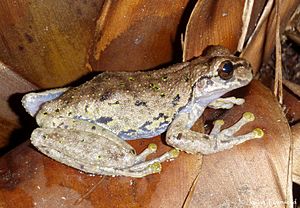Plectrohyla dasypus facts for kids
Quick facts for kids Plectrohyla dasypus |
|
|---|---|
 |
|
| Conservation status | |
| Scientific classification |
|
| Kingdom: | Animalia |
| Phylum: | Chordata |
| Class: | Amphibia |
| Order: | Anura |
| Family: | Hylidae |
| Genus: | Plectrohyla |
| Species: |
P. dasypus
|
| Binomial name | |
| Plectrohyla dasypus McCranie and Wilson, 1981
|
|
| Script error: The function "autoWithCaption" does not exist. | |
Script error: No such module "Check for conflicting parameters".
The Honduras spikethumb frog, also known by its scientific name Plectrohyla dasypus, is a special kind of frog. It belongs to the Hylidae family, which includes many tree frogs. This frog is found only in one specific area: the Sierra de Omoa mountains in northwestern Honduras. It lives inside the Cusuco National Park, which helps protect its home. Sadly, this frog is now critically endangered, meaning it's at a very high risk of disappearing forever.
Where It Lives
The Honduras spikethumb frog loves to live in wet, lower mountain forests. These forests are often misty and full of plants. You can usually find these frogs on low plants near streams. They also like to hide in bromeliads, which are plants that grow on trees and collect water in their leaves.
Life in the Water
Streams are very important for these frogs. They use the streams not just for living, but also for breeding. This means the adult frogs lay their eggs in the water, and the baby frogs (tadpoles) grow up there before they become adult frogs.
Why It's in Trouble
Once upon a time, the Honduras spikethumb frog was quite common. But its numbers have dropped very quickly. Scientists believe a big reason for this decline is a serious disease called chytridiomycosis. This disease is caused by a type of fungus that attacks amphibians, like frogs and salamanders. It makes it hard for them to breathe and absorb water through their skin, which can be deadly. Because of this disease, the Honduras spikethumb frog is now one of the most endangered frogs in the world.
See also
 In Spanish: Plectrohyla dasypus para niños
In Spanish: Plectrohyla dasypus para niños
 | Kyle Baker |
 | Joseph Yoakum |
 | Laura Wheeler Waring |
 | Henry Ossawa Tanner |


